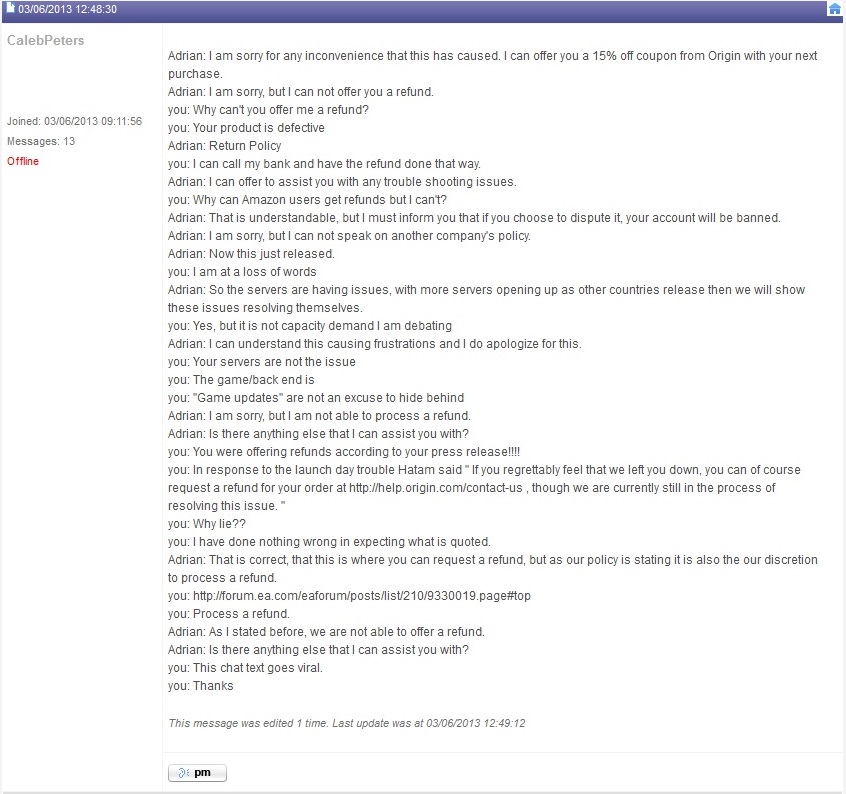The Big Book of Controversies: Chapter VIII


Zombies Ate My Internetz – The War Z
2012-2013
In the early weeks of October, 2012, OP Productions and Hammerpoint Interactive announced their open world massive multiplayer online zombie survival game, War Z. In its Steam description, The War Z initially listed several specific features such as multiple maps roughly 400 sq km, various player skill sets, and private servers, as well as the ability to invest in player-purchased private servers later on. However, early on it became apparent that War Z’s own production teams were not all on the same page. During the alpha testing phase, a controversy arose when the game’s Executive Producer Sergey Titov called some spawn campers a “bunch of faggots.”
“I’m trying to play at least couple hours a day every single day. Getting killed a lot, but 80 percent of all kills are ‘honest.’ I’m just being careless. I’m not trying to hide. 20 percent are shitty kills by faggot’s[sic] who’s spawn camping, or by guys who just want to play the shooter and shoot everyone in sight.”
Company representatives attempted damage control but, needless to say, when The War Z released on Steam on December 17, 2012, fans were less than welcoming of the title. Many noted that the game included only one very small map, virtually no skill sets, and no private servers; directly contradicting the promises made in its original description. By December 19, 2012, amidst consumer outrage citing false advertising, the game was pulled from the Steam store.
In the ensuing non-apology apology interviews, Sergey Titov stated that:
“Our Steam store description contained information about what game features [were] planned for 2012-early 2013 content updates. Some of the features have been in game for a while, so — actually two major things — server rentals and Skill Trees, didn’t make [it] into the game yet. This being said we’ve realized that layout and presentation of this information needs to be changed on the Steam page, which we did today in the morning. After we did it, we [are] still enjoying being [the] Number One top-grossing game on Steam at the moment. So my point is, yes, I’m sure that few players maybe be upset, but I can assure you that based on what we’re seeing number of people who post bad comments are [a] small percentage of people who actually bought [the] game.”
After re-releasing the title on February 26, 2013, The War Z was universally panned by critics, with GameSpy giving the title a half star out of five stating that the game “deserves all the controversy its drawn.” However, the troubles surrounding the title did not end there. On June 20, 2013 the title as changed to Infestation: Survivor Stories after “some confusion and trademark issues with a similarly titled property” were raised.
Currently, Infestation/War Z’s Metacritic review is a paltry 20 Critic and 1.7 User Score.

Don’t Panic and Call Supp- (Server Offline) – EA’s SimCity 2013 Fiasco
2013
EA’s reputation, unfortunately, as been on a tenuous base for years. For every gain, there seemed to be two missteps that offset it. So, as the company set their sites on trying to heal the rift between them and the gaming community by reviving an old fan favorite in SimCity, expectations were high. Initially, as the game ramped up for release in March 2013, many early reviews proved promising. Perhaps EA had finally shed some of that negative baggage for more positive tomorrows.
Or perhaps the ghost of failures past was simply biding its time before haunting gamers once again. Upon release many players began experiencing multiple issues due to the fact that SimCity required a persistent internet connection; most notably being network outages, extremely long server que times (in excess of several hours or more), abrupt disconnects even if you HAD managed to get online, and corrupt or lost game save data.
The game’s AI had also come under fire, with many gamers noting that the game suffered unnecessary traffic congestion, which in turn lead to the inability of certain in game services (police and fire departments) from reaching certain destinations on the city map due to the AI that seemed to want to take the quickest, rather than the less-congested, path through the city.
The issue became so widespread that Amazon.com temporarily removed SimCity from their stores and issue full refunds for those that had purchased it. Initially, however, EA refused to do the same. In fact, EA’s support department even threatened to suspend or ban Origin user accounts for attempting to doing so.

EA eventually relented by offering purchasers of the game a free title from EA’s catalog list. “I know that’s a little contrived – kind of like buying a present for a friend after you did something crummy,” said Maxis Senior Vice-President Lucy Bradshaw,”But we feel bad about what happened. We’re hoping you won’t stay mad and that we’ll be friends again when SimCity is running at 100 percent.”
However, Maxis still maintained that SimCity required, and would always require, a persistent online connection, and that by making the game work in in any real capacity offline would “take a significant amount of engineering work for this to happen.” However, on March 13, 2013, a coder posting on NeoGAF noticed that a single deletion of code allowed the game to run indefinitely offline. Normally, the game would continue for roughly twenty minutes after disconnecting before shutting down. This single deletion of code allowed the city to run. Indefinitely.
By January 13, 2014, Maxis officially confirmed that the game could, and would, run offline with their update 10 patch. Since its initial release, and after multiple large patches, things seemed to have settled down. SimCity has, to date, managed to sell over 2 million copies.
Pages: 1 2




![[PROTOTYPE]](http://www.enthusiacs.com/wp-content/uploads/2020/03/title-104x104.jpg)



I love the investigative nature of these articles! Some might even call that “journalism” 😀